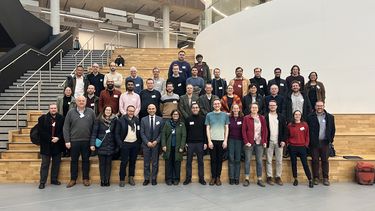The “Advances in Flood Modelling and Forecasting” workshop was a dissemination event of the research culminating from a 5-year Environmental Challenges Fellowship funded by the UK Engineering and Physical Science Research Council (EPSRC) and involved many academic and industrial partners. The Fellowship has addressed themes of relevance to advance flood modelling and forecasting capabilities, which included:
- Integration of human response dynamics into flood risk assessments
- Efficient propagation of many uncertainties into probabilistic flood modelling
- Exploitation of parallel computing architectures for faster large-area simulations
- Design of scalability simulators with increased accuracy and adaptive resolutions
- Incorporation of multi-physics processes including solute and debris in floodwaters
Presentations covered the latest academic advancements made across the above-listed themes, from in-house progresses made by the Fellowship team to achievements made by prominent UK and international researchers.
The workshop followed on from the September 2021 workshop on “Flood Modelling & Forecasting Challenges in Industry”, outlining the progress made to address many of the research gaps and practical needs identified by a mix of flood-related practitioners. It was a unique opportunity to track the latest operational advancements made in the field.
The workshop was attended by 44 participants from academic researchers to industry practitioners, including delegates from city councils, the environment agency and firms from the hydraulic consultancy and software industry.
Dr Kesserwani said: “Such was the success of the workshop, attendees recognised the event’s value for diverse networking and research collaboration and advocated for its annual recurrence.”
You can learn more about the Workshop and access recordings of the event here.
Day one – Session 1. Started with a presentation by Georges Kesserwani, providing a general overview of the EPSRC Fellowship team, their outcomes, and dissemination activities for open-sourcing of software and engaging with stakeholders. The session followed by more elaborate presentations on the outcomes by the team.
- Mohammad Shirvani on the development and application of the agent-based “flood-people” simulator that was adopted by a national data infrastructure facility.
- Mahya Hajihassanpour and Richard Crowder on the most efficient way to quantify uncertainty in flood modelling from many probabilistic sources and practical challenges.
- Alovya Chowdhury on our third release of the open-source version of LISFLOOD-FP 8.2 with dynamic resolution scalability modelling for tsunami inundation simulation.
- Xitong Sun on simplified hydrodynamic modelling to efficiently simulate solute mixing in vegetated river reaches – as a fast alternative to more complex CFD simulators.
Day one – Session 2. Covered state-of-the-art in operational modelling and forecasting from street to continental scale floods, supported by High Performance Computing.
- Pierfranco Costabile on street-scale nowcasting of flood impacts using hydrodynamic modelling from the watershed scale fed by high-resolution rainfall radar data.
- Mario Morales-Hernandez on exploiting hybrid parallel computing architectures to widen the spatial flood modelling coverage with optimised parallel scaling when using a very high number of graphical processing units.
- Daniel Caviedes-Voullieme on developments into the SERGHEI integrated modelling environment, with highlights on the challenges in efficiently allocating memory when computing on graphical processing units and in integrating processes beyond flooding.
- Vasilis Bellos on the various dimensions of uncertainties involved in practical flood modelling, their challenges and associated implications on the state-of-the-practice.
- Albert Chen on real-time forecasting and warning in urban areas with reflection on many outstanding practical challenges for holistic modelling of flooding processes.
Day two – Session 3. Covered fluvial and hydrological aspects of flooding, informed by both experimental and numerical studies, from local sewer-flood interaction to global large-scale forecasting.
- Olivier Delestre on how improved rainfall runoff characterisation improves flood modelling, with a number of demonstrative case studies.
- Esteban Sanudo and Luis Cea on recent high-resolution experimental rainfall data and their use to improve modelling and forecasting of pluvial floods in urban areas.
- James Shucksmith on the experimental understanding of the interaction between underground sewer flow and surface water flooding in urban areas.
- Jeffery Neal on the uncertainties associated with forecasting when moving to model flooding beyond the urban scale to cover countries and continents.
- Ilhan Ozgen-Xian on the use of hydrologic response units and hydrologic connectivity approaches as an efficient alternative to computational hydraulics at large scales.
Day two – Session 4. Covered the multi-physics processes related to flooding, from floating debris to sediment and wood transport, and intervention processes to assess temporal flood defence deployment to reduce risk to households.
- Benedict Rogers on the evolution of their Smooth Particle Hydrodynamic (SPH) solver to include multi-physics applications and exploitation of graphical processing units.
- Gabriella Petaccia on the experimental and numerical simulation on moving logs in rivers with application to real case studies.
- Qiuhua Liang on dynamic feedback between flood simulation and decision-making agents to assess where and when it is worth deploying temporary flood defences to protect households.

